Local stocks closed slightly lower after a mixed trading session on Wall Street. Annual US inflation has fallen to 4.9 per cent, but services and energy prices remain strong.
Catch up on the day's financial news and insights from our specialist business reporters.
Disclaimer: this blog is not intended as investment advice.
Key events
Live updates
Market snapshot at 4:18pm AEST
By Rhiana Whitson
-
ASX 200: -0.05% at 7,251 points
- All Ords: -0.03% at 7,449
- Australian dollar: -0.1% at 67.71 US cents
- Spot gold: Unchanged at $US2,037 / ounce
- Brent crude: +0.9% to $US77.10 / barrel
- Iron ore: +1.5% to $US103.35 / tonne (overnight)
- Bitcoin: -0.3% to $US27,510
- Nikkei: -0.01% at 29,117 points
- Hang Seng: -0.5% at 19,655
- Shanghai Composite: -0.09% at 3,316
Goodbye
By Rhiana Whitson
That's it from me on the live markets blog today. Thanks for reading. We'll be back tomorrow from 6.30am AEST.
RBA warns of up to 80 per cent recession risk
By Michael Janda
Previously confidential internal RBA research, released under Freedom of Information laws, predicts up to an 80 per cent chance of a recession in Australia by September 2024.
The economic modelling, conducted by a senior analyst in the bank's Economic Analysis Department, defined a recession as unemployment increasing by 0.75 of a percentage point over a 12 month period.
Conventional models put the risk of this happening at around 50 per cent.
However, the analyst believed those models underestimated the risk.
Using a different methodology, they found the risk of a recession was between 65-80 per cent over the next two years.
The research was conducted in September 2022, just days before the bank slowed the pace of its interest rate rises from 0.5 of a percentage point per meeting to 0.25 of a percentage point.
Read more in my story on the research, which the RBA released under FOI today.
ASX dragged down by utilities and mining sectors
By Rhiana Whitson
The ASX 200 fell 0.05 per cent on Thursday, closing at 7,251.
The broader All Ordinaries slipped -0.03 per cent to 7,449.
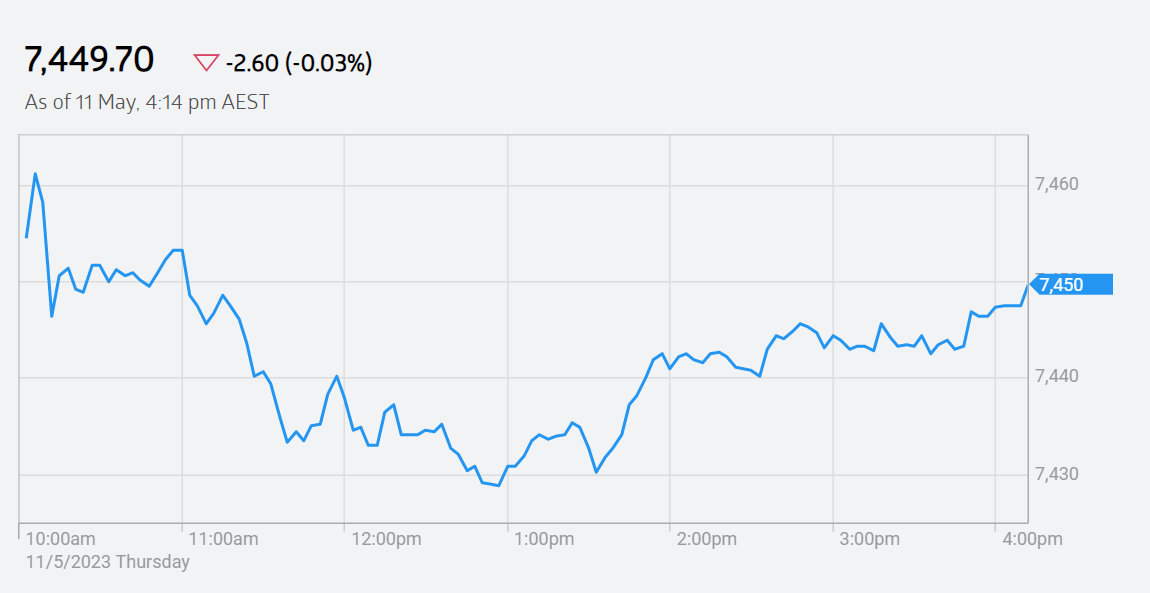
Six of 11 sectors ended higher despite the decline in the overall index, with tech and telecommunications closing with the biggest gains. Utilities and miners were the biggest drags on the ASX.
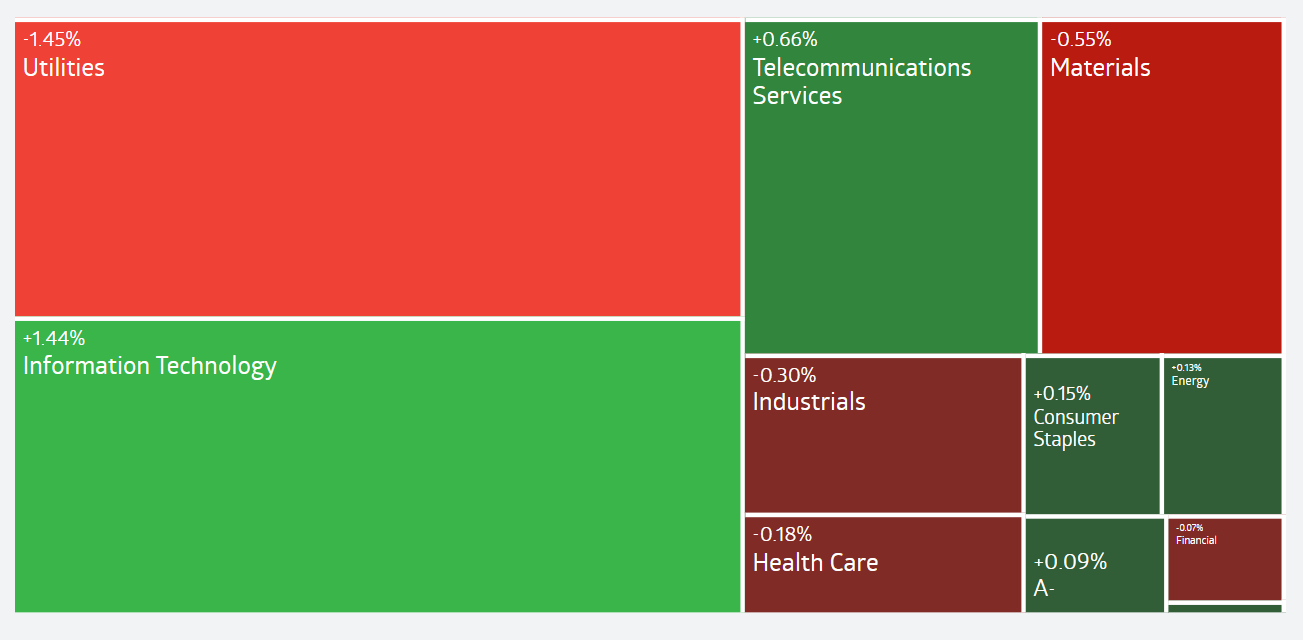
Lithium miner Allkem was the top stock on news the company has secured a merger with a New York-listed company.
Gold miner Silverlake Resources was the worst performing stock. The company has revised its offer for St Barbara Limited's Leonora assets in Western Australia to $707million. Investors must not have been impressed.
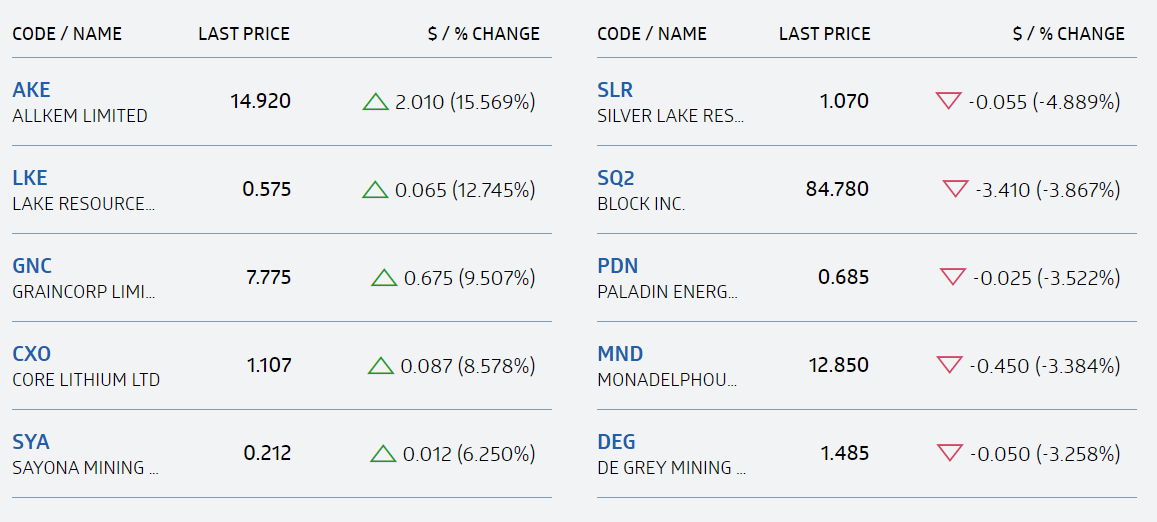
Yellen warns US default would threaten global economy, undermine US leadership
By Rhiana Whitson
US Treasury Secretary Janet Yellen on Thursday urged Congress to raise the $US31.4 trillion federal debt limit and avert an unprecedented default that would trigger a global economic downturn and risk undermining US global economic leadership.
Ms Yellen issued the latest in a series of increasingly stark warnings in remarks prepared for a press conference ahead of a meeting in Japan with her counterparts from the Group of Seven (G7) rich nations, as well as India, Indonesia and Brazil.
"A default would threaten the gains that we've worked so hard to make over the past few years in our pandemic recovery. And it would spark a global downturn that would set us back much further," she said.
"It would also risk undermining U.S. global economic leadership and raise questions about our ability to defend our national security interests."
U. President Joe Biden said failure by Congress to act before Treasury runs out of money to pay the government's bills - something that could happen as early as June 1 - risked throwing the US economy into a recession.
Ms Yellen said Republican brinkmanship on the issue amounted to a "crisis of our own making" and that just the threat of a default could lead to a downgrade of the US government's credit rating, as occurred during a debt ceiling fight in 2011.
It could drive interest rates higher on mortgages, auto payments and credit cards, Ms Yellen said, noting that rates were already spiking on debt due around June 1.
Unlike most developed countries, the US sets a ceiling on how much it can borrow. Because the government spends more than it takes in, lawmakers must periodically raise that cap.
Ms Yellen said she would also work with her G7 counterparts to build greater economic resilience in the longer term by boosting domestic production of critical goods and helping developing countries expand their stake in global supply chains.
- with Reuters
Credit card data drops off as consumer demand wanes
By Rhiana Whitson
The Westpac Card Tracker Index shows consumer demand continues to fall.
The Index declined 7.9 points over the two weeks to May 6, unwinding a brief holiday-related bounce in the third week of April, Westpac Senior Economist Matthew Hassan notes.
"Looking through recent Easter and ANZAC Day related volatility, the Index is basically unchanged since the start of April, holding in the 133-136 range," Mr Hassan says.
"The flat monthly result has taken quarterly growth momentum further into negative territory. The three month change dropped to –0.9% in April, which is the weakest read since the ‘delta’ lock-down in 2021."
Mr Hassan said with the CPI rising 1.4 per cent in the March quarter, the tracker results imply activity is seeing an even sharper contraction in real, inflation-adjusted terms.
"The weakening signal comes as a variety of other measures are also starting to show a material slowdown in spending.
"Official ABS figures show retail sales volumes contracted 0.6% in the March quarter, a second successive decline, with official card-based measures of household spending and tax-based measures of turnover also pointing to weakness in nominal spending, albeit to varying degrees in Q1 and with differences in timing."
Mr Hassan said how this shows through in the official spending figures for the March quarter will be revealed when the Q1 national accounts estimates are released on June 7. Risks appear firmly to the downside.
"The more granular detail shows stalling across all major segments of retail and outright weakness in non-retail activity. Discretionary goods activity is particularly weak, particularly for housing-related and other durables. Growth is notably weaker in NSW and Vic." Mr Hassan said.
Auctions still 40 pc lower than last year
By Rhiana Whitson
The number of homes up for auction this week has increased 1.6 per cent, but it's still 40 per cent lower than a year ago.
There are 1,751 homes expected to go under the hammer across the combined capitals, according to data from Corelogic.
Melbourne is the busiest capital city for auctions, with 728 scheduled - 43.6% below the 1,291 auctions that were held a year ago.
There are 654 homes scheduled to go under the hammer in Sydney this week, 30.9% below the 946 held this week last year.
Capital city auction activity is expected to rise over the coming weeks, with around 1,950 homes currently scheduled for auction next week and roughly 1,900 auctions booked for the final week of May.
Last week’s final combined capitals clearance rate of 69.9% was the highest recorded since late February 2022.
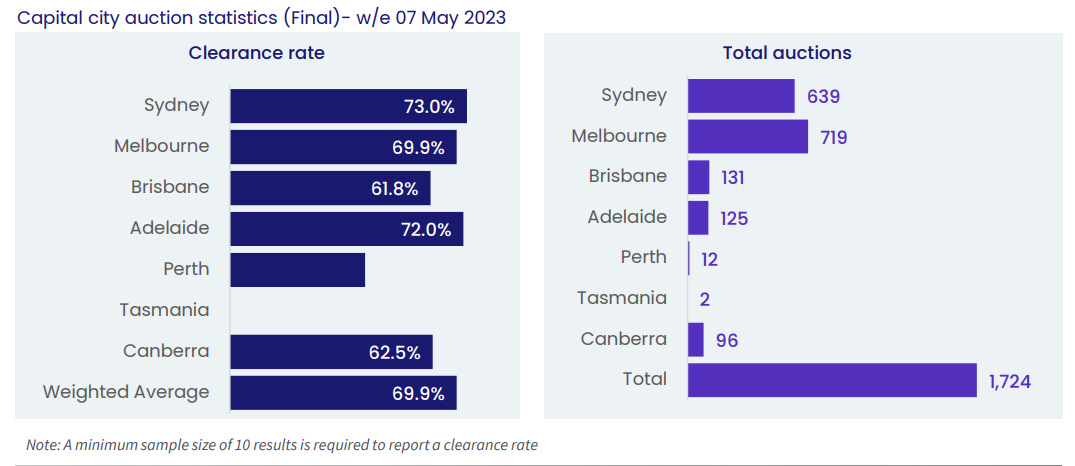
China’s coal and iron ore import growth slow
By Rhiana Whitson
Chinese coal imports are fading as local production ramps up.
China’s coal imports dipped slightly from March to April, with the year-on-year comparison slowing from 152% in March to 73% in April.
|
"The rise in imports has been accompanied by an increase in China’s domestic coal output. Typically, a synchronous increase in both coal production and imports indicates rising coal demand in China," CBA Commodities analyst Vivek Dhar notes. "Industrial output data from last quarter does confirm this narrative. China’s crude steel output has increased ~6%/yr in Q1 2023, supporting the case for higher coking coal output and imports," henotes. "Thermal power output (i.e. mostly coal) has also lifted ~2%/yr in the same time period, largely carried by a ~9%/yr increase in thermal power output in March." Mr Dhar says the increase in China’s coal imports likely indicates some opportunistic buying too. "The sharp fall in international thermal coal prices relative to local prices has made it more attractive to purchase imports for the better part of this year. " China’s thermal coal imports from Australia has been a key beneficiary of this price differential following the end of China’s unofficial ban on Australian coal, Mr Dhar notes. "With the price differential now favouring local coal in the last few weeks, it’s likely that China’s coal imports from Australia will likely moderate. Alongside ongoing evidence of fading industrial demand, we expect China’s total coal imports will start sliding too," Mr Dhar notes. IRON ORE IMPORTS FELL IN APRIL China’s iron ore imports also dropped last month, down 10%. Like coal, China’s iron ore imports have eased in year‑on‑year terms from March to April. "We think it will be challenging for China’s steel output and iron ore imports to keep expanding in coming months given China’s steel mill margins have remained in negative territory since late March. China’s gas imports, which includes both pipeline and LNG, rose by 1% in the month to April and 11% in the year to April. |
|---|
Jobs market moderating, but listings still 35pc higher than before COVID
By Rhiana Whitson
The jobs market appears to be moderating, but listings on Seek are still much higher than before the COVID pandemic hit.
Job ads on listings website Seek fell 1.4 per cent in April.
SEEK job ads are now 21 per cent below their May 2022 peak, but still remain 35 per cent above pre-pandemic levels.
NAB economist Taylor Nugent notes while job ads fell 20.6 per cent from their May 2022 peak to December, over the past four months have fallen just 0.5 per cent.
"The decline in job ads from May last year was a key indicator of some easing in exceptionally tight labour market conditions. This was especially evident in some pockets of the labour market, notably hospitality and tourism," Mr Nugent notes.
Mr Nugent said the labour market overall remains tight with the unemployment rate still at 3.5 per cent, broadly where it has been since the middle of 2022.
"Strong labour demand is absorbing the strong lift in population growth without a lift in the unemployment rate."
"Applications per Job Ad, released with a 1-month lag, continue to increase from the lows of May 2022, and are similar to 2018 levels, which also suggests some of the more acute challenges finding labour may be receding."
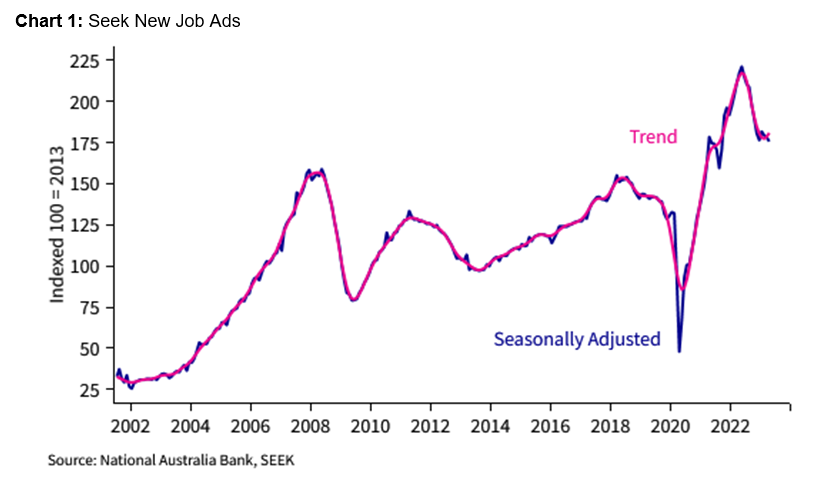
Despite the overall decline, 11 of 28 industries recorded an increase in ads in the month.
The largest increase was recorded in Education and Training.
"This high-employing industry has a tailwind from the rapid rebound in international students and is the only industry to see advertising above the earlier May 2022 peak. Education and Training Ads are now at a new high, 3% higher than in May 2022. The number of international students has rebounded sharply, rising 246k, or 73%, in the year to Q1 2023," Mr Nugent notes.
"In contrast, Hospitality & Tourism Ads, another high-employing industry, was among the largest decliners in the month with advertising falling 5.7%," he notes.
Official Bureau of Statistics unemployment data comes out on Thursday.
NAB forecasts the unemployment rate to move higher toward 4 per cent by the end of 2023.
Market snapshot 12:00pm AEST
By Rhiana Whitson
ASX 200: -0.2% to 7,236 points
All Ordinaries: -0.2% to 7,433 points
Australian dollar: -0.1% 67.70 US cents
Dow Jones: -0.09% to 33,531 points
S&P 500: +0.4% to 4,137 points
Nasdaq: +1% to 12,306 points
FTSE: -0.3% to 7,741points
EuroStoxx: -0.4% to 463 points
Spot gold: +0.1% to $US2,039/ounce
Brent crude: +0.2% $US76.63 /barrel
Iron ore: $US103.35/tonne
Bitcoin: -0.08% at $US27,556
Industrials, miners drag on the ASX 200
By Rhiana Whitson
It's just clocked over to the afternoon trading session.
The ASX 200 has fallen by a quarter of a per cent.
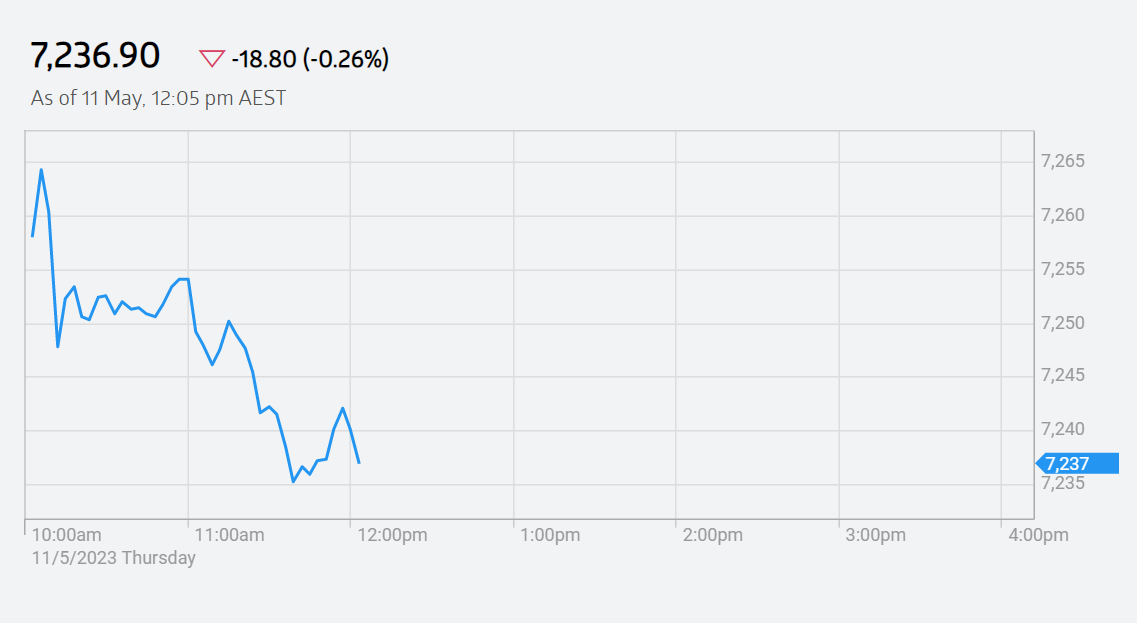
Utilities, miners and industrials are weighing on the benchmark index.
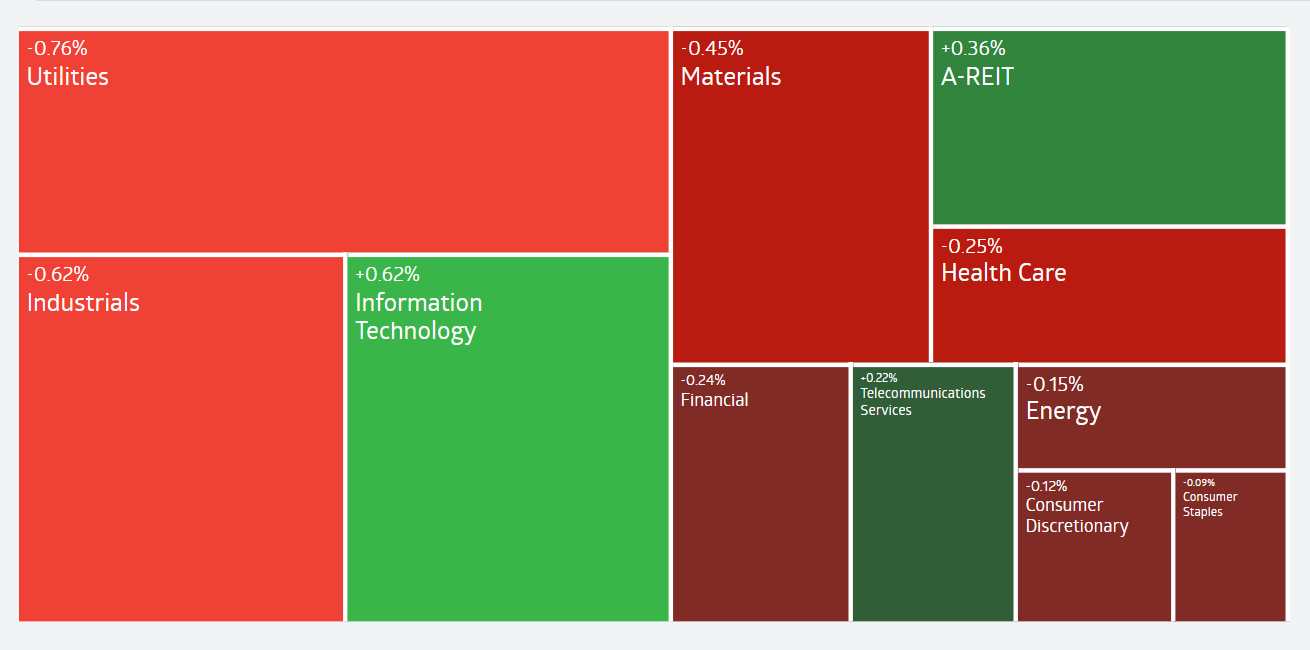
Allkem's merger and company results are dominating the gains and declines.
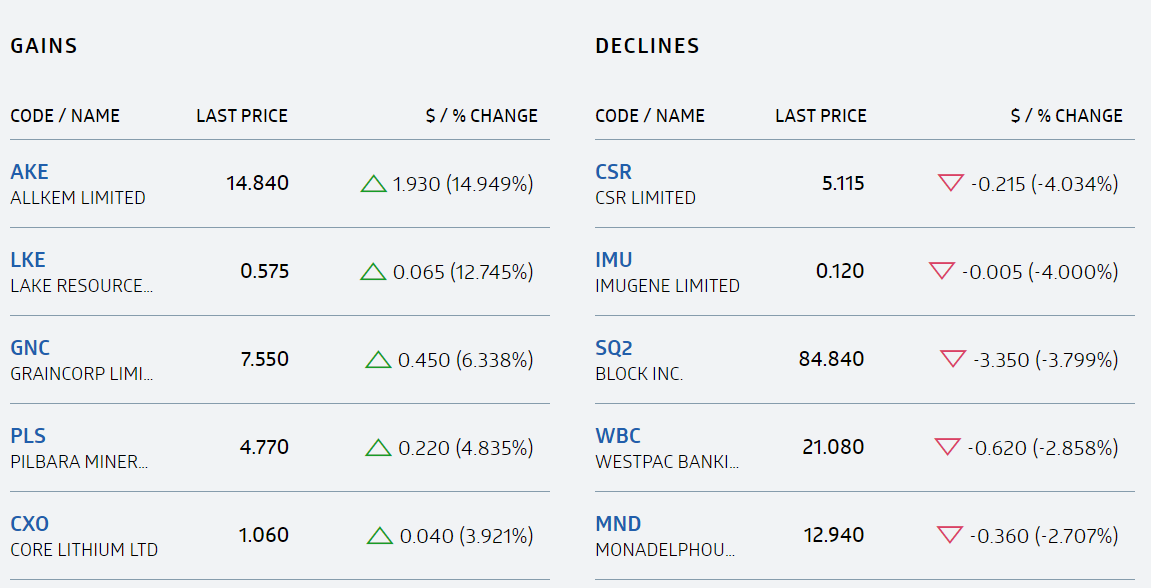
What changes are needed for Australia to become a renewables superpower?
By Rhiana Whitson
The federal government reckons its budget will turn Australia into a renewables superpower. Will it?
Catch up on my story for The Business here:
Could the budget fuel inflation and rate rises?
By Michael Janda
It's the ongoing debate dominating the economic response to the budget.
Both Chris Richardson and Steven Hamilton reckon it will increase inflation, with the possibility of tipping the RBA into another rate rise, if the central bank was on the edge.
They spoke to The Business yesterday:
But not all economists agree.
Former RBA economist and now economics lecturer Zac Gross says the effect on inflation will be negligible.
Investment bank Barrenjoey's economics team came up with a similar result from their modelling, as covered by the ABC's Kate Ainsworth:
Banks, utilities and industrials drag on the ASX
By Rhiana Whitson
The ASX 200 is trading lower this morning, down just a few points at 7,251.
Here's how things are looking as we approach 11am AEST:
Leading the charge is lithium miner Allkem which has announced a $US10billion ($14.79billion) merger with US-listed company Livent.
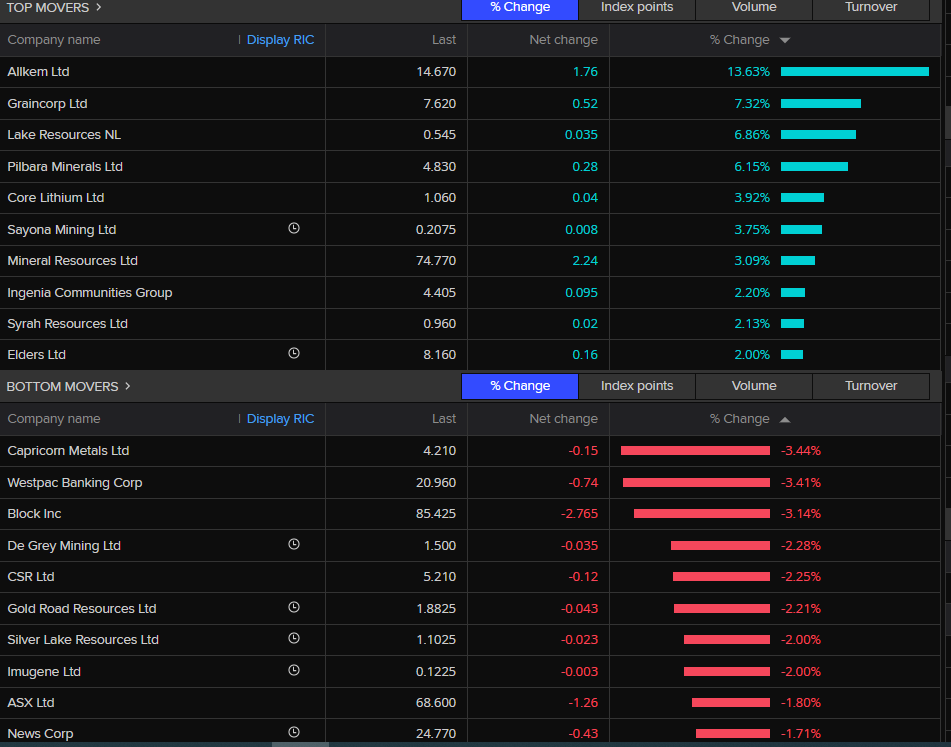
The real estate and consumer staples sectors are providing the biggest boost to the ASX.
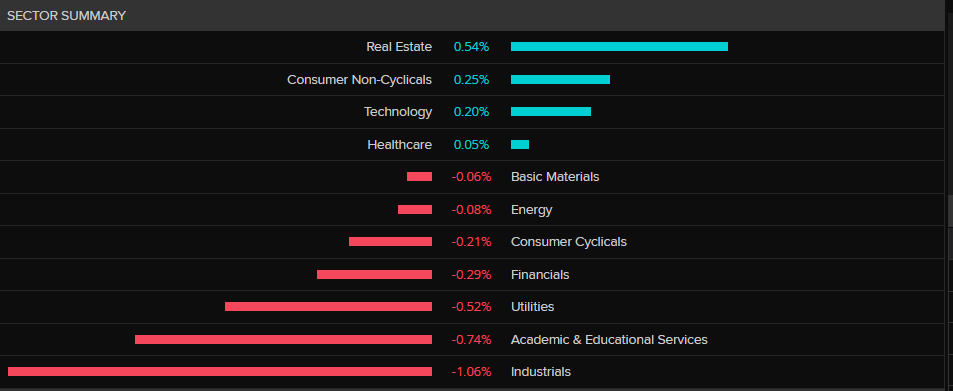
Market snapshot at 10:25am AEST
By Rhiana Whitson
ASX 200: Down 3.3 points to 7,252 points
All Ordinaries: Down 2.2 points to 7,450 points
Australian dollar: +0.2% 67.89 US cents
Dow Jones: -0.09% to 33,531 points
S&P 500: +0.4% to 4,137 points
Nasdaq: +1% to 12,306 points
FTSE: -0.3% to 7,741points
EuroStoxx: -0.4% to 463 points
Spot gold: +0.1% to $US2,037/ounce
Brent crude: -1.1% $US76.59 /barrel
Iron ore: $US103.35/tonne
Bitcoin: -0.08% at $US27,556
Graincorp lifts guidance, despite weaker profits
By Rhiana Whitson
Agribusiness company GrainCorp has posted lower half year profits but lifted its earnings guidance.
Earnings before interest, taxes, depreciation, and amortisation (EBITDA) were $383 million, down from $427 million in the previous corresponding period.
Net profit after tax (NPAT) was $200 million, down from $246 million in the first half of 2022.
Grancorp lifted its full year guidance: EBITDA of $500- $560 million, up from $470- $530 million.
NPAT of $220- $260 million, up from $180- 220 million.
GrainCorp's Managing Director and Chief Executive Robert Spurway said there was ongoing demand for Australian grain and oilseeds, supported by a bumper third crop on the east coast.
"GrainCorp's export program ran at close to full capacity with 4.4mmt of grain and oilseeds exported during the half," Mr Spurway said.
"Export supply chain margins remained solid, albeit not at the levels we saw last year."
The company also acknowledged the death of a worker in a fatal truck accident in April at the Graincorp receival site in Moree, New South Wales.
Us inflation slows to below 5 per cent, Jim Chalmers moves to quell fears about the budget
By Rhiana Whitson
Catch up on what made financial news overnight with ABC senior business correspondent Peter Ryan:
Market snapshot at 8:30am AEST
By Rhiana Whitson
ASX SPI 200 futures: -0.2% to 7,250 points
Australian dollar: Flat at 67.78 US cents
Dow Jones: -0.09% to 33,531 points
S&P 500: +0.4% to 4,137 points
Nasdaq: +1% to 12,306 points
FTSE: -0.3% to 7,741points
EuroStoxx: -0.4% to 463 points
Spot gold: +0.1% to $US2,037/ounce
Brent crude: -1.1% $US76.59 /barrel
Iron ore: $US103.35/tonne
Bitcoin: -0.08% at $US27,556
Do the PRRT changes in the budget go far enough to fix a 'broken' Petroleum Resource Rent Tax?
By Rhiana Whitson
The federal government will collect $2.4 billion from gas exporters through the PRRT over four years.
The gas industry isn't really complaining. According to Treasury, no LNG project has ever paid the tax. Some experts say the government should've gone a lot harder.
Wall street mixed on CPI data and debt ceiling worries
By Rhiana Whitson
Here's some detail about how the US markets ended up overnight:
The Dow Jones Industrial Average fell 30.48 points, or 0.09 per cent, to 33,531. The S&P 500 gained 18.47 points, or 0.4 per cent, at 4,137, while the Nasdaq Composite added 126.89 points, or 1 per cent, at 12,306.
The Nasdaq was helped by a 4.1 per cent climb in Google's parent company Alphabet as the company rolled out more artificial intelligence for its core search product in response to competition from Microsoft Corp.
Large-cap tech stocks including Apple Inc and Microsoft also gained 1.04 per cent and 1.73 per cent, respectively.
The rate-sensitive S&P 500 technology sector index went up 1.2 per cent and the communication services rose 1.69 per cent.
Markets reacted positively because they saw the inflation data as a small positive, with hopes rising of a rate pause.
"The CPI is indicating some sort of relief in inflationary pressure. That would mean the Fed would be toward the end or already at the end of its interest rate cycle, and growth companies are most heavily affected by higher interest rates," Kevin W. Philip, a partner at investment advisor Bel Air said.
Fed funds futures traders are pricing in a pause in rate increases at the central bank's June meeting, and less than a 5 per cent chance of another 25 basis point hike.
However, investors also had concerns about the looming US debt ceiling.
Talks on raising the US federal government's $US31.4 trillion debt ceiling entered a new phase on Wednesday as some areas of potential compromise emerged after Tuesday's White House meeting.
Regional bank shares extended declines from volatile sessions last week on concerns about the sector's health. PacWest Bancorp fell 0.5 per cent, and Zions Bancorporation fell 2.7 per cent respectively.
Oil and gas producer Occidental Petroleum Corp fell 3.6 per cent after its first-quarter earnings fell short of analysts' estimates.
Livent Corp rose 5.2 per cent after Australian lithium miner Allkem Ltd agreed to merge with the US-based chemical manufacturing firm to create a $US10.6 billion firm.
Airbnb Inc 10.9 per cent as the vacation rental booking company had fewer bookings and lower average daily rates in the second quarter.
Rivian Automotive jumped 1.8 per cent after the electrical vehicle maker beat estimates for its first-quarter results and reiterated its annual production forecast.
- with Reuters







